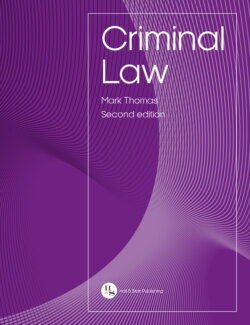Читать книгу Criminal Law - Mark Thomas - Страница 101
На сайте Литреса книга снята с продажи.
2.7Causation
ОглавлениеWhere the defendant is charged with any result crime (ie a crime which requires a particular consequence to occur in order for liability to exist – see 2.3.2), the prosecution must prove that his act or omission caused the prohibited result. Causation applies only to result crimes and has no part to play in conduct-only crimes given that the end result itself is irrelevant. Figure 2.2 demonstrates this principle.
Many students often cite causation as an element separate to that of the actus reus and mens rea. This is incorrect. Causation is an essential element of the actus reus of a criminal offence where an end result is necessary for liability to be present (result crimes). Therefore, ensure that when you deal with causation, you make it clear that it remains part of the actus reus of an offence.
Figure 2.2Conduct and result crimes and causation
in practice
In most cases, causation rarely becomes an issue. For example, in homicide cases, how the victim came to die is usually not in dispute. Often it is obvious that a victim, let us say Jack, died as a result of the act of the defendant, say Jill, in shooting him.
However, you are expected to be aware of the full remit of causation in your study of criminal law. Therefore, where there is a dispute, the question of causation is one for the jury to decide as a matter of fact. It is the duty of the trial judge to direct the jury on the legal principles relating to causation, but it is for the jury, applying those principles, to decide if the causal link between the defendant’s conduct and the prohibited consequence has been established.
There are two main principles in causation:
•causation in fact (factual causation); and
•causation in law (legal/imputable causation).
The prosecution must prove both tests of causation in order for a defendant to be liable. The decision as to whether the prosecution has proven causation is a matter of fact for the jury (recently affirmed in R v Clarke and Morabir [2013] EWCA Crim 162). A further principle that requires discussion is that of new and intervening acts. Considered further at 2.7.3, new and intervening acts are those that may disrupt the existence of liability against a defendant where the defendant’s conduct is no longer considered the ‘cause’ of the end result.
In approaching an issue of causation, therefore, it is essential to follow a set plan.
Figure 2.3Approaching causation
We shall consider both forms of causation now and then deal with new and intervening acts.
